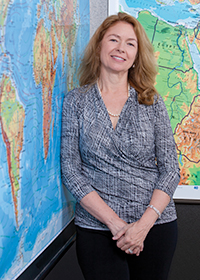Margaret Gonzalez-Perez
President's Award for Excellence in Research
The Circle of Research and Teaching

Margaret Gonzalez-Perez learned from a mentor that in the academic world it’s not the books you write or the articles you publish that are most important.
“What’s most important are your students. It’s all about the human beings that you affect,” said the political science professor, who is this year’s winner of the President’s Award for Excellence in Research.
Gonzalez-Perez has an impressive research background: author of two books, co-author of another and contributions to several others. She has written and presented 21 professional research papers and has served as panel chair or discussant at 13 additional political science conferences, most of which were national or international.
A former professor told her once it was people like her who truly mattered in the academic world. He said that it pleased him to see a former student inspiring her own students, to change their lives to conduct their own research and encouraging them to think on their own - a circle of teaching and research of sorts.
“Former students contact me to read papers they wrote and ask my opinion,” she said. “I am still impacting them and remain a part of their lives, and that’s great. In a way, I’m still teaching them.”
The holder of the C. Howard Nichols Endowed Professorship in History and Political Science, Gonzalez-Perez is best known for her research on international politics and women in terrorism. Her first book, Literature of Protest: The Franco Years, is based on her 1994 LSU doctoral dissertation and explores the resistance to Spanish dictator Francisco Franco. The second book, Women Terrorists: Female Activity in International and Domestic Terrorism, has helped her gain an international reputation.
“She is a particularly worthy candidate for the Excellence Award for Research,” said Department of History and Political Science Department Head William Robison, “not only for the high quality and substantial quantity of her scholarship, but also because she published on the very important and timely subject of international terrorism. She integrates her research into the upper-level classes she teaches on international politics and regularly shares the results of her work with larger audiences through participation in professional conferences and via public lectures on campus and elsewhere.”
For Gonzalez-Perez, teaching and research go hand in hand. One is just as important as the other. And her teaching inspires her research. Much of her inspiration, she said, comes from students’ questions.
“I enjoy research because I can choose the topic, look at things and present them in different ways,” she said. “That helped me in studying, for example, how Islam became radicalized from the 13th to the 21st centuries and helped me explain it to my students.”
Research, she said, is important for a number of reasons. It helps her hone her discipline and prepares her for the classes she teaches. It allows her to bring new information to existing and opposing theories.
“I tell my students that I don’t care if you are right or left. I don’t care what you think. I care THAT you think,” she explained. “You can come to your own conclusion. You don’t need me to tell you what to think,” she said.
After Sept. 11, Gonzalez-Perez became interested in studying terrorism and felt she had found her focus. With women in terrorism, she began her research mainly out of curiosity. She wanted to know why women participate in groups that are largely dominated by men. What started as enough information for a paper eventually grew into a book.
“There really wasn’t a book about women in global terrorism, so I decided to write one,” she said. “Now my book has been used for a lot of terrorism courses in the nation. I didn’t write it as a text book, but that is what it has become.”
When asked what she enjoys most about research, Gonzalez-Perez said she likes gathering and organizing information to make it more understandable. She likes to give real life examples to her students, and research provides those examples.
“Research is always interesting. With terrorism, there is always something new,” she said. “Whether it’s Hezbollah, Al-Qaeda, or now ISIS, there is never a lack of new material. I like that because I can tie it back into my teaching. It keeps the matter relevant to real life.
“I really enjoy research and teaching. Professors don’t teach because of the money. It’s because of the students. They are the reason we hang on. You can conduct research anywhere, but it is more enjoyable working with students.”
